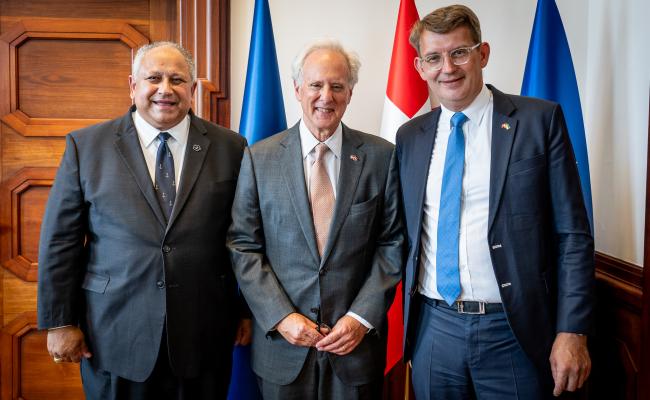The Faroe Islands Threatens to Exit Nordic Cooperation: “We Are either All in or Not at All”
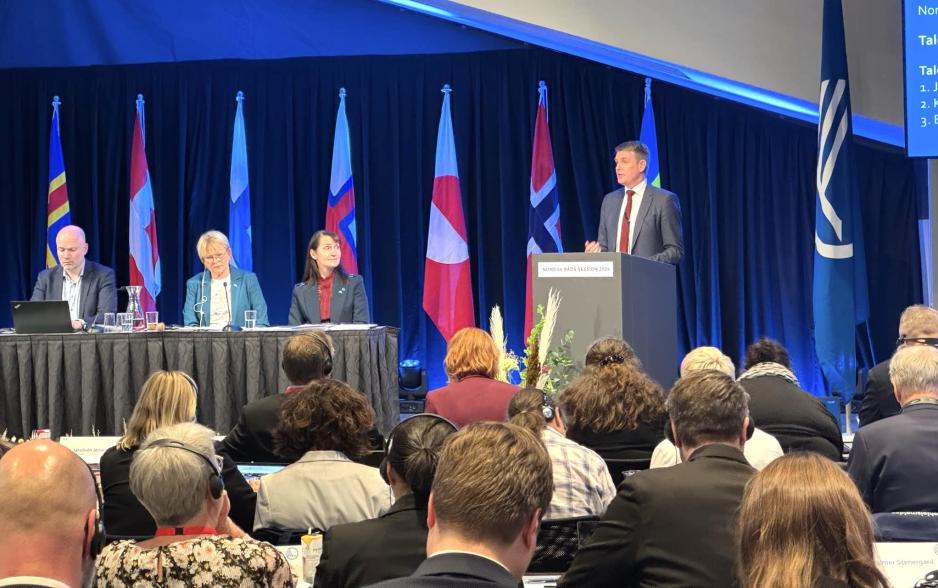
If action does not follow the words about strong unity, the Nordic Council and the Nordic Council of Ministers will lose their value to the Faroe Islands, maintains the Faroese Prime Minister Aksel V. Johannesen (Javnaðarflokkurin) at the Nordic Council Session 2024 in Reykjavík, Iceland. (Photo: The Government of the Faroe Islands)
The Faroe Islands and Greenland will no longer accept exclusion from Nordic summits on foreign and security policy – and demand full-fledged membership of the Nordic Council and the Nordic Council of Ministers. Now the Nordic Council is calling for a renewal of the Helsinki Treaty.
"It's raining in the library, and there is a leak between theory and practice." So goes one of the most famous lines from the poetry collection Líkasum, which the Faroese poet Rói Patursson won the Nordic Council's Literature Prize for in 1986."
With these words, the Faroese PM V. Johannesen begins his speech at the Nordic Council session 2024 in Reykjavík last week.
"The theory says that the Nordic region shall be the world’s most integrated region. The most democratic region. That we are equal. But that obviously does not apply to all the Nordic countries. In practice, we are sadly kept out by some states. We have experienced that more than once by the chairship in the past year," he continues.
Sweden, this year's chairship of the Nordic Council of Ministers and the coordinator of the N5 format, has not invited the Faroe Islands and Greenland to several Nordic ministerial meetings – such as the Nordic-Ukrainian summit on the sidelines of the Nordic Council Session last Monday.
"We wish that we jointly break the pattern in which smaller countries are left out when big decisions are made. There is a concrete proposal to change the Helsinki Treaty on the table so that we can obtain equal participation in this valuable cooperation in the long term."
"It is time we stop the leak between theory and practice. For our standpoint is completely clear: We are either all in or not at all," says Johannesen.
The Faroe Islands and Greenland did not receive an invitation to:
• The Nordic Heads of Government meeting with the German chancellor about security and competitiveness in Stockholm from May 14th to May 15th. This is known as the Nordic PMs' summer meeting.
• The Nordic Heads of State and Government meeting with the President of Ukraine on security and defense in Stockholm on May 31st.
• Nordic Heads of Government meeting with the President of Ukraine on military support in Reykjavík on October 28th.
• Nordic foreign ministers' meeting (N5) on current security policy issues in Reykjavík on October 30th.
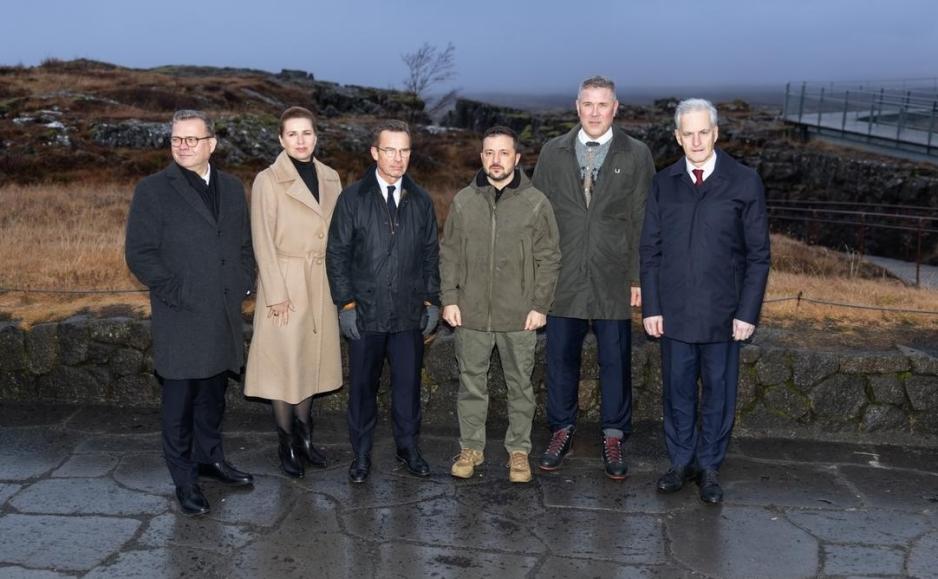
The Nordic-Ukrainian summit last Monday without the Faroe Islands and Greenland (from the left): Finnish PM Petteri Orpo, Danish PM Mette Frederiksen, Swedish PM Ulf Kristersson, Ukrainian President Volodymyr Zelenskyj, Icelandic PM Bjarni Benediktsson, and Norwegian PM Jonas Gahr Støre. (Photo: Magnus Fröderberg/norden.org)
Greenlandic boycott
Greenland's government, Naalakkersuisut, boycotted the Nordic Council session.
PM Múte B. Egede and Vivian Motzfeldt, Minister for Foreign Affairs and Independence, were thus not present in Reykjavík last week. The rationale is straightforward:
"The lack of equality in the cooperation between the Nordic countries, where Greenland, the Faroe Islands, and Åland are excluded from essential debates and conversations in Nordic ministerial meetings, constitutes an increasingly significant problem. Greenland can no longer accept this, especially when the central theme for this year's session of the Nordic Council is peace and security in the Arctic."
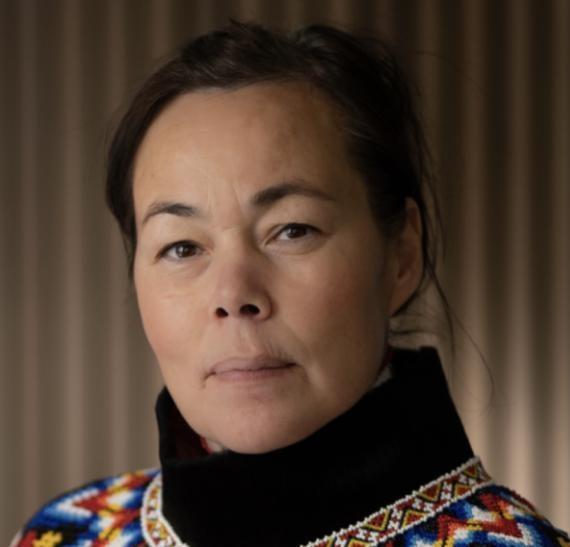
Vivian Motzfeldt (S), Greenland's Minister for Independence and Foreign Affairs. (Photo: Naalakkersuisut)
The statement came from Greenland's Ministry of Foreign Affairs and Independence last Tuesday.
"It is regrettable that we have to come to the point that we in Naalakkersuisut have to cancel our participation. Nordic cooperation should stand for equality, democracy, and inclusion. Especially when peace and security in the Arctic are to be discussed, the Nordic countries should involve and listen to all the Arctic peoples," underlines Motzfeldt and continues:
"It is time for the Nordic Council and the Nordic Council of Ministers to become more inclusive."
Nordic cooperation
• The Nordic Council is the official body for Nordic inter-parliamentary cooperation. The council has 87 elected members from Norway, Sweden, Finland, Denmark, and Iceland – and the self-governed countries Greenland, the Faroe Islands, and Åland.
• The Nordic Council annual session is the Nordic region's political summit. The session is the council's highest decision-making body – and gathers both parliamentarians and ministers from the Nordic countries.
• The Nordic Council of Ministers is the official body for Nordic inter-governmental cooperation. The five Nordic states are the council's members. The Faroe Islands, Greenland, and Åland are also represented.
• N5 is the five Nordic states' informal cooperation format for foreign and security policy matters. The state that holds the year's Nordic Council of Ministers chairship serves as the coordinator of N5 meetings.
Helsinki Treaty update
On Thursday afternoon, the Nordic Council members recommended that the Nordic governments renew the Helsinki Treaty.
The treaty regulates the official Nordic cooperation and is considered its 'constitution.' It was last updated in 1995.
In 2023, the Nordic Council executives established a working group with representatives from all eight countries to assess the need to renew the treaty.
Based on the group’s report of April 2024, the Council recommends that the governments set up a commission to draw up a concrete proposal for the update.
The issue of treaty renewal will now be considered at national level in the various countries, and the governments will submit a joint response via the Nordic Council of Ministers.
Relevant questions for the treaty's revision are whether the Faroe Islands, Greenland, and Åland may become independent members of the Nordic cooperation – and whether defense, preparedness, and public security are to be included as cooperation areas.

The Nordic flags fly in Reykjavík during the Nordic Council's 2024 session. (Photo: Eythor Arnason/norden.org)
Receives backing of Denmark
Denmark's PM Mette Frederiksen stands behind the Faroe Islands and Greenland's desire for a full-fledged membership.
"We should have a Nordic cooperation that includes eight Nordic countries, not just five. This should be based on respect and equality," she says at the Nordic Council Session on Tuesday and continued:
"Therefore, before this year's session, I wrote to my Nordic prime ministerial colleagues that the Danish government supports the Helsinki Treaty revision so that the Faroe Islands and Greenland can achieve full membership within the legal framework that applies to the two countries."

Denmark's Prime Minister Mette Frederiksen (S). (Photo: Eythor Arnason/norden.org)
Necessary in regard to Russia
Frederiksen emphasizes that Denmark, the Faroe Islands, and Greenland are working together to modernize their commonwealth – also concerning international forums.
"We don't always see things the same way; we are three different countries with three different sets of eyes. But we have strengthened our ties. Our dialogue is stronger and better. It is good for the commonwealth. It would also be good to do in a Nordic context – and necessary in the world we live in," she points out and elaborates:
"Because Russia wants nothing more than for us to split, for polarization to increase in our societies. That is why Russia uses fake news, influence campaigns, and hybrid attacks. Thus, I think we have a special obligation to cooperate equally and properly."
From clear to more vague signals
The Faroese and Greenlandic search for equality in the Nordic cooperation was also met with support from Iceland.
"We have been very open and positive about the Faroe Islands and Greenland's wishes. We have always had good relations with both countries. This year, the Icelandic Republic celebrates its 80th anniversary. Our history makes it very easy for us to relate to this desire and the idea behind it: You will do better the more you are allowed to stand on your own two feet," says Iceland's Prime Minister Bjarni Benediktsson.

Iceland's Prime Minister Bjarni Benediktsson (Independence Party). (Photo: Magnus Fröderberg/norden.org)
Norway, Sweden, and Finland kept their cards close to their chests in this matter during the same plenary meeting last Tuesday:
"We have a pragmatic relationship to the Helsinki Treaty. We await the discussion about Greenland, the Faroe Islands, and Åland," says Norwegian Prime Minister Jonas Gahr Støre.
His Swedish colleague, Ulf Kristersson, was also awaiting the Nordic Council's recommendation regarding the Helsinki Treaty.
Kristersson added that Finland, the incoming chair of the Nordic Council, will address a possible change to the treaty and that the Swedish government looks forward to constructive talks.
"As far as the Helsinki Treaty is concerned, Finland is committed to reform work," says Finnish Prime Minister Petteri Orpo.
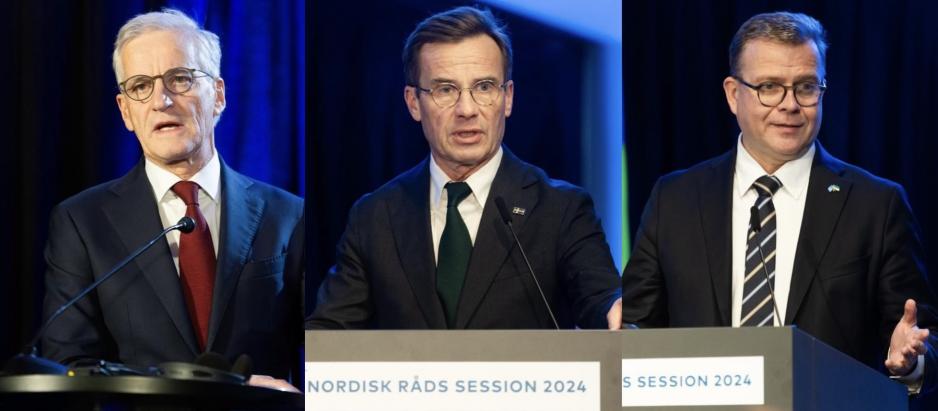
From left: Norway's PM Jonas Gahr Støre (Labor), Sweden's PM Ulf Kristersson (M) and Finland's Prime Minister Petteri Orpo (NCP). (All photos: Magnus Fröderberg/norden.org)
Legal framework
A pending question is whether the Faroe Islands and Greenland's constitutional status as parts of the Kingdom of Denmark can create limitations for the exercise of independent membership in Nordic cooperation.
This was also addressed at last Tuesday's plenary meeting between the parliamentarians and the government leaders.
"If there is a problem with the constitution, it is a problem between the Faroe Islands and Denmark, and I believe we can find a solution to that. We are in dialogue with the Danish government," says Faroese PM Johannesen and continues:
"We are, of course, in a commonwealth with Denmark, and there are currently no plans to change that. But we don't know now what the state will be like in the future. After all, it can change in 10, 20 or 50 years."
Law and political will
Both PM Johannesen and PM Frederiksen point out that the Faroe Islands Home Rule Act and the Greenland Self-Government Act have clauses for dispute resolution vis-à-vis the Danish authorities. See Faroe Islands Home Rule Act § 6 and the Greenland Self Government Act § 18.
"We greatly understand the Faroe Islands wanting its own WTO membership. There have been some legal discussions about whether it can be done or not. We are trying to reach a clarification on that, and the same can apply, one might say, to the Nordic cooperation," says Frederiksen and continues:
"In other words, the legal aspect is something we are trying to clarify, and then there is what I'd call political will, i.e., whether in our cooperation forums, including the Nordic ones, we want equality and to get all the countries involved."
Two alternative proposals
The question of legal frameworks is also relevant in the report from the Nordic Council's aforementioned working group.
The members have different views on whether the Faroe Islands, Greenland, and Åland should be given rights and duties as independent members of Nordic cooperation.
Therefore, the working group has presented two alternative recommendations:
• "That the governments of the Nordic countries revise the Helsinki Treaty so that participation in the Nordic cooperation is based on equality between the countries, and that the participation of Greenland, the Faroe Islands, and Åland in the Nordic cooperation reflects the development of self-government and provides flexibility to accommodate differences and future development.
• ... or that the governments of the Nordic countries assess how the Helsinki Treaty can be changed to enable strengthened participation in the Nordic cooperation for Greenland, the Faroe Islands, and Åland concerning the legal framework that regulates the relationship between Denmark, the Faroe Islands, and Greenland, respectively Finland and Åland.”



